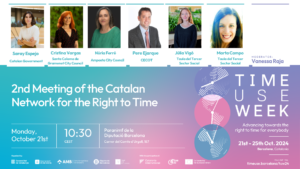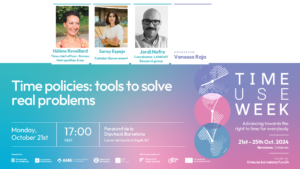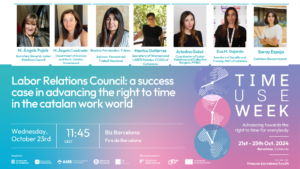Time Use Week 2024
Advancing towards the right to time for everyone
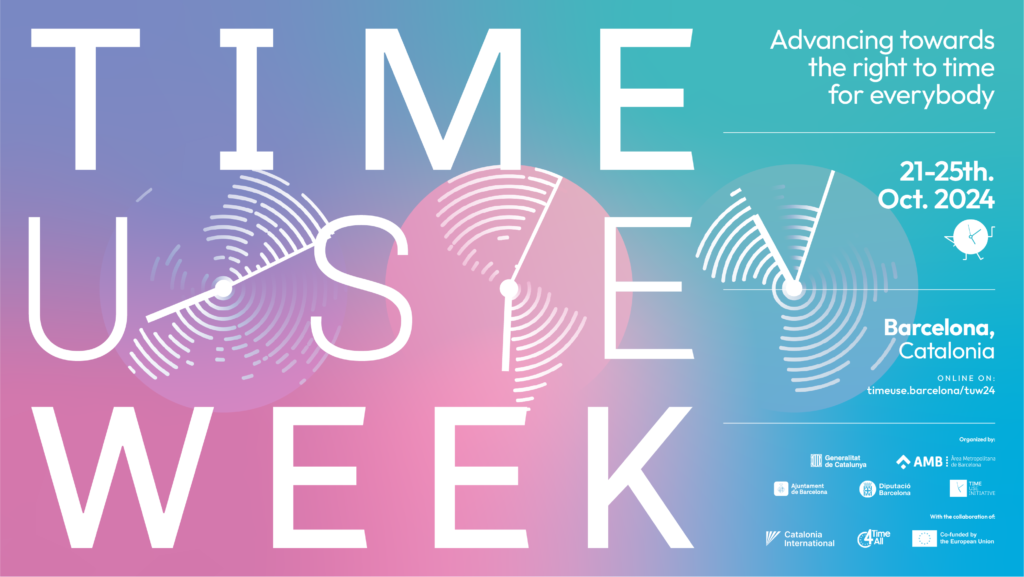
Alba Barnusell I Ortuño - Diputació de Barcelona
Boróka Bó - Sociologist
Carl Honoré - Promotor Slow Movement
Diego Golombek - Investigator CONICET
Marta Junqué - Time Use Initiative
Raquel Gil - Ajuntament de Barcelona
Raquel Gil - Barcelona City Council
Saray Espejo - Generalitat de Catalunya
Alba Barnusell - Diputació de Barcelona
Gemma Badia - Àrea Metropolitana de Barcelona
Hélène Reveillard - Rennes City Council
Jessamyn Encarnación - UN Women
Juha Haaramo - Statistics Finland
Pamela Quiñones - Ayuntamiento de Bogotá
Raquel Gil - Ajuntament de Barcelona
Saray Espejo - Generalitat de Catalunya
Ugo Lachapelle - IATUR
Laura Foraster - Catalonia International
The right to time: a right for everyone
The social organization of time causes significant dissatisfaction among a large part of the population, leading to health, equality, productivity, and sustainability issues. It is evident that we have a problem with time and urgently need to seek a more equitable and sustainable organization of time use. One of its most evident consequences is the existence of time poverty in various forms globally, impacting all social classes, albeit unequally affected by each axis of discrimination (gender, origin, age, ability…).
In Europe, approximately 20% of the population suffers from time poverty, particularly affecting women. In Latin America, this figure exceeds 50% depending on the country, while in Asia, karoshi, or death from overwork, remains a significant cause of mortality according to the International Labour Organization.
As articulated in the 2021 Barcelona Declaration on Time Policies, the first political statement acknowledging the importance of the right to time and time policies, the solution to this issue lies in recognizing the right to time. This acknowledgement is crucial to addressing discontent and time poverty, promoting a more balanced and equitable use of time.
To establish the right to time, active involvement of public institutions is essential. Since the early 2000s, municipalities have been pioneers in this domain, but in today’s global context, constructing effective public policies requires the engagement of metropolitan, supra-local, regional, and global institutions.
Public initiatives must also catalyse changes within the social and productive fabric. Organizing decent working time serves as a necessary complement to public time policies.
The right to time should be enshrined as a new civic right, ensuring it is universally accessible. Everyone deserves the assurance of their personal time to live, enjoy life, and have greater autonomy. The benefits of the right to time extend to individuals, organizations, society, and the planet alike. This year, the TUW’s goal is to advance towards the universal accessibility of the right to time.
Advancing towards the right to time for everyone
The Time Use Week (TUW) is a global event dedicated to promoting knowledge and inspiring case studies in time policies. Researchers, political institutions, social and economic organisations, and citizens from around the world will participate to foster dialogue across diverse fields of expertise and experiences, aiming for improved social organization of time. The tenth edition of TUW will take place from 21st to 25th October, with international days being 21st and 22nd, in Barcelona, and will be themed “Advancing towards the Right to Time for Everyone“.
TUW 2024 aims to comprehensively approach the right to time. It will engage specialized audiences such as institutions, social stakeholders, and the research community. Additionally, this year’s event is committed to including activities and initiatives accessible to the non-specialised public by different organisations in the world.
The focal point of this year’s edition will be updating the Action Plan of the Barcelona Declaration on Time Policies. This will provide a collective framework for organisations already committed since 2021, as well as newcomers and those initiating efforts towards better time management. The updated plan will outline specific commitments for the 2024-2026 period.
Participants attending the Week in person will have access to various on-site activities, including workshops and networking opportunities. Additionally, for the first time, TUW 2024 introduces a collaborating organisation badge for entities interested in hosting initiatives during the event.
Institutional partners
Time Use Week 2024 is co-organised by the Catalan Government, the Barcelona City Council, the Metropolitan Area of Barcelona, the Barcelona Provincial Council, and the Time Use Initiative.
It counts with the collaboration of Catalonia International and Time4All (project co-funded by the European Union).
Pre-TUW events are only in person and in Catalan.
Wednesday 18th September — Challenges of the labour market.
At Teatre del Cafè Nou (carrer la Riera, 123), Mataró. More information and registrations. Organised by UGT Catalunya.
Thursday 10th October — The right to time: a basic element for happiness.
Location: CaixaForum Macaya, Barcelona (Passeig de Sant Joan, 108). Co-organized by the “la Caixa” Foundation and the Time Use Initiative.
Time: 18:30.
What is the basis of happiness? Recent studies link life satisfaction to a common variable: time. This session will delve into the relationship between time and happiness, analysing how the right to (one’s own) time can increase individual and community well-being.
With the participation of:
- Azhara Alonso, writer.
- Norbert Bilbeny, Professor Emeritus of Ethics at the University of Barcelona.
- Ariadna Güell Sans, coordinator of the Time Use Initiative.
- Beth Espinalt Capdevila, promoter of the Subjective Well-being Index of Catalonia.
Moderated by:
- Maria Cusó Serra, journalist and Head of Culture at RAC 1
Thursday 10th October — Redesigning Home Spaces for the Autonomy of Children Aged 0-3 Years
Location: Carrer del sol 13, Ripollet. Organized by Els Solets Minnilandia SCCL.
This talk addresses the importance of finding the right space for each family member. We discuss shared parenting in practice, the role of each adult in the family, how we can find our own moments, and the importance of self-care to provide quality care. Redesigning home spaces to give children their own area also means allowing them to find their own space and begin identifying their needs from an early age.
Thursday 16th October — Towards a new time balance
Location: CaixaForum Tarragona (Cristòfor Colom Street, 2), Tarragona. Co-organized by the “la Caixa” Foundation and the Time Use Initiative.
Time: 18:00.
Redefining the meaning of work necessarily involves rethinking how we organize work time and, above all, how we harmonize it with other temporal needs in our lives, including family time, personal time, community time, and rest. There are already various practical proposals for change, as well as regulatory proposals to adapt to the labour needs of the 21st century.
With the participation of:
- Anna Ginès, Associate Professor of Labor Law at Ramon Llull University and ESADE, and member of the Expert Council of Time Use Initiative’s network.
- Gonzalo Pin, head of the Sleep Unit team and coordinator of the Pediatrics Service at Quirónsalud Valencia Hospital.
- Marta Junqué, director of TUI.
Facilitated by:
- Laura Casas, journalist at Tarragona Ràdio.
Every Wednesday in October — Caring for Yourself to Care for Others: Yoga and Meditation Sessions for Caregivers
Location: Carrer del sol 13, Ripollet. Organized by Els Solets Minnilandia SCCL.
Yoga to care for our body when we are mothers, fathers, grandmothers, caregivers… both physically and mentally. We often don’t consider that the work that most disconnects us from our needs as individuals is caring for our family.
Venue: Paranimf de la Diputació de Barcelona (access by carrer Urgell, 187), Barcelona.
Registration and accommodation at the Venue.
Hybrid event. Language: English, Catalan, Spanish.
With the participation of:
- Saray Espejo Benito, Director General for Care, Time Organization and Work Equity of the Catalan Government
- Cristina Vargas Soria, Sixth Deputy Mayor for Internal Services, Participation Policies, Equality and Commerce of the Santa Coloma de Gramenet City Council
- Núria Ferré i Cardona, Councillor for Social Rights, Citizenship and Health of the Amposta City Council
- Pere Ejarque Guillamat, Head of Career Guidance and Job Placement at CECOT
- Júlia Vigó, Head of Equality and Feminisms at the Taula del Tercer Sector Social
- Marta Campo, Head of Strengthening Policies at the Taula del Tercer Sector Social
Hybrid event. Language: English, Catalan, Spanish.
With the participation of:
- Lidón Gasull, director of aFFaC, presents the study “The school day under debate”.
- Dolors Bassa i Coll, representative of UGT Catalunya, presents the analysis of registered equality plans and measures and policies for reorganizing work time.
- Júlia Quintana, analyst at Ivàlua, presents the study “Needs assessment: care in Catalonia”.
- Adriana Gil Juárez, Associate Professor of the Department of Basic, Developmental and Educational Psychology at the Autonomous University of Barcelona, presents the GEiO project, “Gender Equitable Interactions Online”.
Hybrid event. Language: English, Catalan, Spanish.
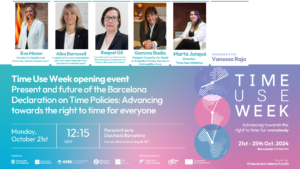
With the participation of:
- Eva Menor Cantador, Minister for Equality and Feminism of the Catalan Government.
- Alba Barnusell Ortuño, President of the Social Sustainability, Life Cycle and Community Area of the Barcelona Provincial Council
- Raquel Gil Eiroá, Councillor for Economic Promotion, Work, Feminisms, and Democratic Memory of the Barcelona City Council
- Gemma Badia Cequier, Delegate Councillor for Social and Equality Policies of the Barcelona Metropolitan Area
- Marta Junqué Surià, Director of the Time Use Initiative
Hybrid event. Language: English, Catalan, Spanish.
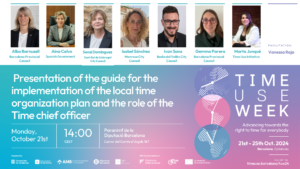
With the participation of:
- Alba Barnusell Ortuño, President of the Social Sustainability, Life Cycle and Community Area of the Barcelona Provincial Council
- Aina Calvo, Secretary of State for Equality of the Spanish Government.
- Ivan Sanz, Second Deputy Mayor for Accompanying People, Social Welfare, Education, Housing and Health of Badia del Vallès
- Sensi Domínguez, Councillor for Employment and Occupational Training, Gender Equality and Feminism, Time Reform, and People with Disabilities of the Sant Boi de Llobregat City Council
- Isabel Sánchez Pulido, Councillor for Feminism and LGBTI of Manresa
- Gemma Parera, Technical advisor in the Social Sustainibility, Life Cycle and Community Area of the Barcelona Provincial Area
- Marta Junqué, Director of the Time Use Initiative
Hybrid event. Language: English, Catalan, Spanish.
With the participation of:
- Joaquín Pérez Rey, Secretary of State for Work of the Spanish Government
- Marina Lafay, Deputy Mayor of the Strasbourg City Council and Metropolitan Councillor of the Strasbourg Eurometropolis
- Petra Dzurovcinova, Head of innovation of the strategic innovation area at the UNDP
- Ugo Lachapelle, President of the International Association for Time Use Research
- Claes-Mikael Ståhl, Deputy Secretary General of the European Trade Union Confederation
On-site work meetings. Language: Catalan.
- Plenary of the Catalan Network for the Right to Time. Room: “Torre Muntaya”
- 3rd Meeting of the Network of Professionals of Equity in Labour. Room: “Torre Mar”
Hybrid session. Language: English, Catalan, Spanish.
It will include:
17:00 – 17:20: Reducing Waiting Time: Rush Hour and Urban Sustainability by Hélène Reveillard, Time Chief Officer of the Municipality of Rennes
17:20 – 17:40: Freeing Time for Caregivers: The Case of Temps x Cures by Saray Espejo Benito, Director General for Care, Time Organization and Work Equity of the Catalan Government
17:40– 18:00: Night Governance Mechanisms: the case of Night Mayors by Jordi Nofre, Fundaçao para a Ciência e a Tecnologia Associate Research Professor of NOVA University of Lisbon and coordinator of the LXNIGHTS research group
Venue: Paranimf de la Diputació de Barcelona (access by carrer Urgell, 187), Barcelona.
On-site meeting. Language: English.
Registration and accommodation at the Venue.
Hybrid event. Languages: English, Spanish, Catalan.
With the participation of:
- Jessamyn Encarnación, Inter-regional Advisor on Gender Statistics at UN Women
- Eniel Ninka, Team Leader for Health, Time Use, Household Budget Surveys (F.4: Income and living conditions; quality of life) of Eurostat
- Juha Haaramo, Senior Statistician of Statistics Finland
- Xavier Cuadras, Director of the Statistical Institute of Catalonia
On-site event. Language: English, Spanish, Catalan.
With the participation of:
- Marina Lafay, Deputy Mayor of the Strasbourg City Council and Metropolitan Councilor of the Strasbourg Eurometropolis
- Marta Junqué Surià, Secretary General of the Local and Regional Governments Time Network
- Pamela Quiñones Sánchez, Advisor to the Secretary for Women of the Bogotá City Council
- Jean-Yves Boulin, vice-President of Tempo Territorial
On-site event. Language: Catalan. Room: “Torre Muntanya”
- Xavier Cuadras, director of the Statistical Institute of Catalonia
- Representative of the Catalan Government
- Mar Camarasa Casals, officer of the Feminism and LGTBI area of the Barcelona City Council
- Joan Garcia, Researcher of the Demographic Studies Center
- Pere Rovira, partner-founder of OneTandem
Hybrid event. Languages: English, Spanish, Catalan.
14.30 – 14.50: Designing transversal time policies by Ariadna Güell, director of the Time Use Initiative
14.50 – 15.10: Time as a space of social consensus by Míriam Martínez Camacho, Officer of the Feminism and LGTBI area of the Barcelona City Council
15.10 – 15.30: Questions and answers
On-site session. Language: English. Room: “Sala Presidenta”
On-site session. Language: Catalan. Room: “Sala Entresol Muntanya”
Organised by QUIT, Center for Sociological Studies on Everyday Life and Work of the Autonomous University of Barcelona
Location: Carrer Muntells, 1, Amposta. Event only in Catalan.
Opening Conference
Explanation of the project and the conference.
Reflection Space: How has time influenced your life
At the headquarters of the Montsià County Council, a reflection space will be set up for 15 days before the event. This space will feature an interactive installation designed for the entire county to express their experiences, thoughts, and lived experiences around time management, work, and work-life balance, and how these factors have influenced their lives.
This space is designed to give voice to our community’s experiences and generate a collective debate on the importance of time management in our lives. We encourage you to participate and share your perspectives!
The week of the event, we will share on our social networks (those of the Montsià County Council) the results of the opinions collected through the reflection space and the interactive installation. These reflections will help us visualize the reality of time management, work-life balance, and their influence on our lives. Additionally, throughout October, we will display these results in the hall of the Montsià County Council for everyone to see and reflect on these shared experiences. We want to give visibility to this reality and foster collective dialogue around a topic that affects us all.
Round Table: “Care Time Management: Work-Life Balance, Motherhood, and Equality”
We are pleased to announce the celebration of a round table dedicated to a topic of great relevance and social impact: the management of care time in the context of work-life balance, motherhood, and equality. The event, titled “Care Time Management: Work-Life Balance, Motherhood, and Equality,” aims to explore the complexities and challenges associated with managing time dedicated to care, both at an individual and collective level.
Our intention is to foster a space for reflection and debate where professionals from various areas share their experiences, knowledge, and perspectives.
Venue: Biz Barcelona (Fira de Barcelona, pavelló 8)
Registration and accommodation at the Venue — note: it has changed, from Paranimf to Fira de Barcelona.
On-site event. Language: Catalan.
With the participation of:
- M. Àngels Pujols Muntada, Secretary General of the Labor Relations Council
- M. Àngels Cuadrada Basquens, Deputy Director General of Labor Relations of the Department of Business and Labour of the Catalan Government
- Beatriz Fernández-Tubau Rodés, representative of Foment del Treball Nacional in the Commission for Equality and Working Time
- Mentxu Gutiérrez Jiménez, Secretary of Women and LGBTI Policies of CCOO Catalonia
- Ariadna Guixé Ors, Head of Labor Relations and Collective Bargaining at PIMEC, micro, small and medium-sized enterprises of Catalonia
- Eva M. Gajardo Rodríguez, Secretary of Equality and Training of the UGT of Catalonia
- Saray Espejo Benito, Director General for Care, Time Organization and Work Equity of the Catalan Government
On-site event. Language: Catalan.
With the participation of:
- Marta Rodríguez Martín, Director of Organization, People and Culture of Mercabarna
- Susana Pascual García, Director of Continous Improvement and Sustainability of Acefat
- Ana Pérez Clemente, BPM Consultant of Iterem
- Maria José Blanco, Head of Strategic Employment Plans at Barcelona Activa
Location: Carrer Muntells, 1, Amposta. Event in Catalan only.
Practical Workshop
The 4-hour practical workshop on time management, led by Marta Zaragoza, will provide key tools for balancing personal and professional life, helping to establish priorities, plan effectively, and reduce stress.
Thursday 24th October — Time Lapse
Location: Carrer Muntells, 1, Amposta. Organized by the Montsià County Council.
Time: 10:00 AM – 1:00 PM
Lecture: “Women in High Positions and Time Management” Presented by Sònia Guerra
During her intervention, Sònia will discuss current challenges in the labor market, especially in relation to women occupying positions of responsibility. Additionally, she will share her own experience and professional career, offering a valuable perspective on how she has managed her time and the difficulties she has encountered along her path. It will be a unique opportunity to hear firsthand about the challenges and learnings of a woman with a successful trajectory in the professional world.
Transgenerational Conversation: What has changed and what remains to be done?
The radio host from Santa Bàrbara (Tere Giné from La Plana Ràdio) leads a transgenerational conversation to discuss the past and present of work-life balance and time management. What has changed and what remains to be done?
Closing of the conference
Thursday 24th October — What are Time Policies?
Location: Auditorium of the Department of Culture (Carrer Major, 14), Tarragona. Organized by the Territorial Services of the Department of Equality and Feminisms of the Government of Catalonia in Tarragona.
Time: 9:30 AM – 1:00 PM
Agenda:
- 9:30. Welcome
- 10:00. Lecture: “What are time policies and their impact?”
- 10:30. Round Table: Experiences in implementing Right to Time policies in the Camp de Tarragona area
- 11:30. Coffee Break
- 11:30. Workshop: Diagnostic tool on Right to Time Policies for municipalities
- 12:30. Closing
Friday 25th October — Time Lapse
Location: Carrer Muntells, 1, Amposta. Organized by the Montsià County Council.
Time: Morning
Meeting of Women from Montsià
Saturday 26 October - The mystery of lost time
Location: Play space 0-99, Clariana de Glòries, Barcelona. Organised by: Pacte del Temps de Barcelona, Barcelona City Council.
Time: 11.00 – 13.00h
Family activity “The mystery of lost time”, aimed at children and families, with the aim of raising awareness about the responsible use of screen time among the youngest ones in the city through play.
Free activity, without prior registration. More information here.
Thursday 31st October — Time Poverty, a Social Challenge to Address
Location: CaixaFòrum Tarragona (Carrer de Cristòfor Colom, 2), Tarragona. Coorganised by the “la Caixa” Foundation and the Time Use Initiative.
Time: 6:00 PM
For years, defining poverty solely as an economic value has been questioned, but time poverty is still scarcely used when assessing its multiple dimensions. Nevertheless, people without time for themselves cannot develop new skills and opportunities, create community, participate in democracy, and much more, which prevents their free development as individuals and full participation in society. A two-way conversation about what time poverty is, who it affects most, what impacts it has on inequality across different axes, and what can be done to reduce it through political action.
With the participation of:
- Joan Garcia, researcher at the Center for Demographic Studies (CED)
- Sara Moreno, Professor of Sociology at the Autonomous University of Barcelona and researcher at the Center for Sociological Studies on Everyday Life and Work (QUIT)
Facilitated by:
- Laura Casas, journalist at Tarragona Ràdio
Thursday 31st October — Monologues in the Square
Location: Plaça Neus Català, Manresa. Time: 5:30 PM to 7:00 PM. Organized by the Department of Feminisms and LGBTI of the Manresa City Council.
Interactive street performance where the audience will find characters in the square who will explain their dilemmas related to theatrical themes about care and co-responsibility, and care and machismo, with a dimension of the right to time. Performed by Nus Cooperativa.
Friday 15th November — Metropolitan Social Table: Right to Time
Organised by the Barcelona Metropolitan Area
Working session for representatives of municipalities that are members of the Metropolitan Social Table. More information and registration will be available soon.
Program:
- 9:30 AM to 10:00 AM: Welcome coffee
- 10:00 AM to 11:30 AM: Working session
Wednesday 27th November — Time Was Time: A Transgenerational Look at Time Use
Location: Centre Dones Despí (John F. Kennedy Street, 4. Sant Joan Despí). Organised by Sant Joan Despí City Council.
Time: 5:00 PM – 6:30 PM
A talk-colloquium where we will explore some of the questions related to time and its uses: What is our experience of time in our historical present? How do the different generations living together understand it? What is the relationship between productive time and care time? What do we know about time thieves?
Presented by Núria Beitia Hernández, Officer for Equity in Labour of the Sant Joan Despí City Council.
Transformative initiatives to extend the right to time
Transformative initiatives during Time Use Week — Social and economic stakeholders
Apply synchronous and asynchronous schedules among teams (to ensure that meetings are held at times that facilitate work-life balance; allow extended arrival and departure times to facilitate work-life balance, etc.)
- Productors Audiovisuals de Catalunya (PAC)
- Consell de Treball, Econòmic i Social de Catalunya
- Associació Salut i Família
- OneTandem
Implement a pilot test of the 37.5-hour working week
- Associació de Famílies Nombroses de Catalunya (FANOC)
Implement a pilot test of the 32-hour working week
- Pla Estratègic Metropolità de Barcelona
- aFFaC
Provide the option to have lunch in less time than usual and to leave earlier to promote work-life balance
- Confederació de Treballadors Autònoms de Catalunya (CTAC)
Finish the work schedule before 19h
- Associació catalana dones Directives i Empresàries – Dones pel Futur
Implement the self-assessment tool for time policies
- Associació Catalana de Recursos Assistencials (ACRA)
- Federació de Cooperatives de Treball de Catalunya
- Marinva
- Espai Ambiental SCCL
- Associació de Professionals Autònoms i Empreses (APAE)
Implement a pilot test of measures or leave options, beyond those established by regulations, that promote work-life balance and co-responsibility
- Federación Española de Asociaciones Pro-Lactancia Materna (FEDALMA)
- Consejo Nacional de las Mujeres de España
Implement a pilot test of measures to increase autonomy in managing work time (time banks, recoverable flexibility…)
- Associació Cultural Arxiu i Memòria
Other initiatives
- SlowShop Lleida: Time Reform Day.
- Pimec: a study on time use from the entrepreneur’s point of view.
- Consell de Relacions Laborals de Catalunya: DES-CONNECTES. More information.
- Asociación Iberoamericana de los Bancos de Tiempo: “Books on Time” project
Transformative initiatives during Time Use Week — Local and Regional Governments
Coordinate an awareness campaign (conferences, awareness…)
- Ajuntament Hospitalet de Llobregat
- Ajuntament de Manresa
- Ajuntament de Sant Joan Despí
- Ajuntament d’Oliana
- Ajuntament de Tarragona
- Consell Comarcal del Montsià
- San Javier Public Library
Evaluate own time policies (using the self-assessment tool)
- Ajuntament de Sant Martí Sesgueioles
- Basque Government
- Hospital del Mar de Barcelona
Transformative initiatives during Time Use Week — Research
Organization of a study presentation, debate or talk about time use in the field of study
- Universitat Autònoma de Barcelona
- Universitat Oberta de Catalunya
Publish analysis on time-use tendencies
- Universitat de Barcelona
Awareness campaigns
- Universitat Oberta de Catalunya




